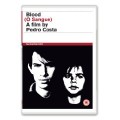| Reviews & Columns |
|
Reviews DVD TV on DVD Blu-ray 4K UHD International DVDs In Theaters Reviews by Studio Video Games Features Collector Series DVDs Easter Egg Database Interviews DVD Talk Radio Feature Articles Columns Anime Talk DVD Savant Horror DVDs The M.O.D. Squad Art House HD Talk Silent DVD
|
DVD Talk Forum |
|
|
| Resources |
|
DVD Price Search Customer Service #'s RCE Info Links |
|
Columns
|
|
|
Blood (O Sangue)
Shot in full-frame (1.33:1) monochrome by cinematographer Martin Schäfer (Kings of the Road, Radio On) Blood seems to be a film out of time. Blood could as easily have been filmed in 1964 as 1989 with its iconic compact European cars and mix of old and mid-century architecture, were it not for a soundtrack that includes the British '80s synth-pop band The The, and the occasional bit of technological gadgetry.
Superficially, Blood is a drama about a family coming apart upon the illness and subsequent death of the sole parent. The players are an unnamed father (Canto e Castro) with an unspecified illness and outstanding debts to underworld associates; two sons, seventeen-year-old Vicente (Pedro Hestnes), a boy too quickly made a man by familial responsibilities to his younger brother, and ten-year-old Nino (Nuno Ferreira), a fragile dreamer; the teenage Clara (Inês de Medeiros) who occupies the role of comforter to the boys, perhaps as a potential lover to Vicente and surrogate mother to Nino; and finally the boys' uncle (Luís Miguel Cintra) from Lisbon who wants to provide a home to Nino, even if it's too late to save Vincente from himself.
Change is unavoidable for the boys. With the sudden and not fully explained death of the father, it appears either the boys' bond will reform around Clara, or the family will bust up.
Blood isn't a film that gives up all of its secrets on a first viewing. The dramatic narrative is neither as simple nor as central as its description might suggest. The drama is studded with narrative ellipses and undeveloped digressive leads. Omissions left for the audience to fill are thickest around those persons closest to the boys: especially their father and Clara, but also the uncle and the father's girlfriend who appears late in the final act.
Even were the film not as deceptively enigmatic as it is, it would invite reexamination for its filmic references. At heart, Blood is a cinematic love letter from a neophyte director to the giants that proceeded him. Some the references are obvious, particularly the debt due to Robert Bresson, others are so slight that they might be unconscious to Costa or even the imagination of the viewer. In his accompanying essay, Adrian Martin finds more than three dozen such references, but it's as easy to suggest several more or to take issue with some of those he's claimed. Likely new associations will arise in the viewer's mind on subsequent viewings even as some past conjectures are reinforced and others undermined by reexamination.
Presentation
Blood (O Sangue) has been released from the UK-based boutique DVD label Second Run on a single dual-layered DVD which is region-restricted to 2 and 4, and PAL-encoded.
Video & Audio:
Blood is presented in its original aspect ratio of 1.33:1. The progressive monochromatic image is sumptuous. The image is almost entirely free of dirt and defect, contrast in excellent, and the image is sharp.
The original 2.0 Portuguese audio has been restored eliminating any signs of age. The stereo mixing is subtle, but suitable to the film. The optional English subtitles appear well translated and are easy to read.
Extras:
Extras on this release include (1) a sixteen-minute video of Professor João Bénard da Costa, Director of the Portuguese Cinematheque reading a personal essay about Blood written in long-hand, accompanied by film clips; (2) a photo gallery of production stills; and (3) a sixteen-page booklet with essays about Blood from Adrian Martin and Frédéric Bonnaud.
Final Thoughts:
Blood (O Sangue) is a demanding film. Viewers not willing to fill the gaps in the narrative with their own tentative conjecture, or frustrated by narrative tangents suggested but not followed, or who otherwise seek an intrinsically self-contained drama will be disappointed. Blood is a cinematic love letter, best appreciated by cinephiles ready to wrestle with the film over repeated viewings.
|
| Popular Reviews |
| Sponsored Links |
|
|
| Sponsored Links |
|
|
| Release List | Reviews | Shop | Newsletter | Forum | DVD Giveaways | Blu-Ray | Advertise |
|
Copyright 2024 DVDTalk.com All Rights Reserved. Legal Info, Privacy Policy, Terms of Use,
Manage Preferences,
Your Privacy Choices | |||||||












